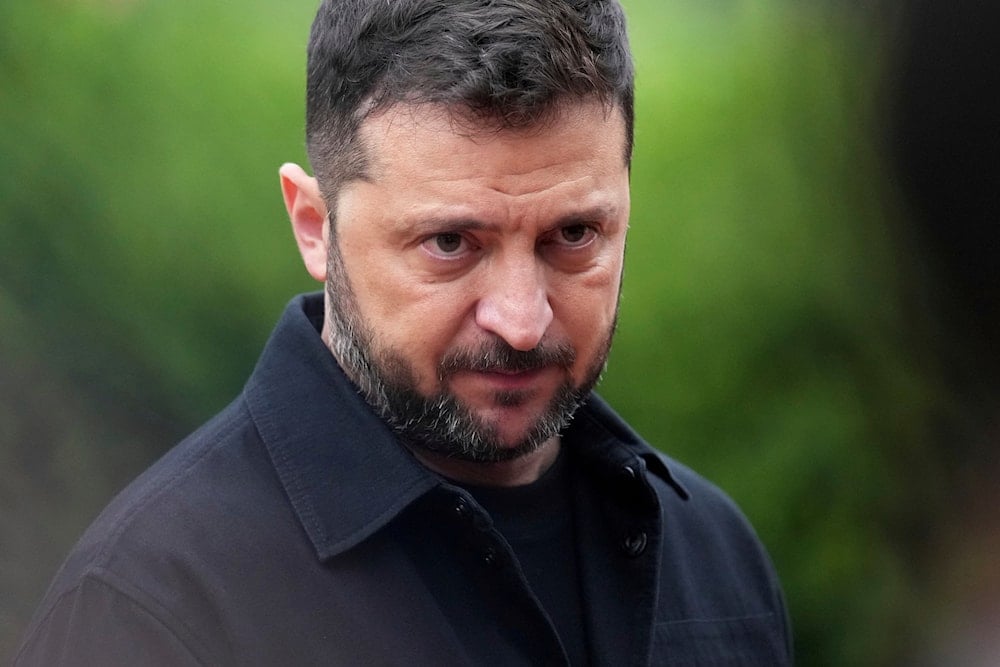Zelensky rejects Russia’s push to include China in security plan
Russia has argued that lasting security in Ukraine requires the inclusion of major powers like China, stressing that Western-only guarantees lack credibility.
-

Ukraine's President Volodymyr Zelensky speaks in Lafayette Park, across from the White House, after meeting with President Donald Trump and European leaders Monday, Aug. 18, 2025, in Washington. (AP Photo/Jacquelyn Martin)
Ukrainian President Volodymyr Zelensky dismissed Russia’s proposal to include China among potential guarantors of Ukraine’s security in the event of a ceasefire.
“We don’t need guarantors who don’t help Ukraine, and didn’t help Ukraine at the moment when we really needed it,” Zelensky told reporters in Kiev. “We need security guarantees only from those countries that are ready to help us.”
Zelensky’s remarks followed his Monday meeting with US President Donald Trump and European leaders at the White House, where Washington pledged stronger support for Ukraine’s security framework. While Trump reiterated that American troops would not be deployed to Ukraine, he indicated the US might provide air support. European leaders are still weighing what their own contributions could entail.
Moscow floats China’s inclusion in security plan
Russian Foreign Minister Sergei Lavrov argued on Wednesday that any reliable security arrangement for Ukraine must involve Russia and potentially China, referencing an agreement drafted in Istanbul during the early phase of the war in Ukraine. Kiev rejected that proposal, citing provisions that would have allowed Russia to veto the actions of other guarantor states if Ukraine were attacked.
Zelensky noted receiving “positive signals” from Trump about the US role in shaping security guarantees. He claimed that military and security officials from Ukraine’s allies have begun drafting the framework, or “architecture,” of these guarantees, with further details expected within a week to 10 days.
Zelensky open to talks with Putin in a neutral venue
In line with Trump’s push for renewed diplomacy, Zelensky reaffirmed his willingness to meet Russian President Vladimir Putin, but under clear conditions.
“There can be no meeting in Moscow,” he said, rejecting suggestions of Budapest as well, citing Hungarian Prime Minister Viktor Orban’s stance as “against supporting Ukraine.”
Instead, Zelensky proposed “neutral Europe” for the summit, naming Switzerland, Austria, or Turkey, already a venue for earlier ceasefire negotiations, as potential hosts.
Russia will not accept NATO troops in Ukraine as security guarantee
In a post on X Wednesday, Russian Security Council Deputy Chairman Dmitry Medvedev stated that NATO troops cannot be peacekeepers in Ukraine, emphasizing that Russia will not accept such security guarantees for Kiev.
Earlier this week, French President Emmanuel Macron told TF1 and LCI broadcasters that Russia had allegedly become a "destabilizing force" and a "threat to Europeans."
"The brainless Gallic rooster [Macron] can't let go of the idea of sending troops to 'Ukraine.' It's been explicitly stated: NO NATO troops as peacekeepers. Russia won't accept such a 'security guarantee.' But the hoarse, pathetic bird continues to crow to prove it's king of the coop," Medvedev said on X, commenting on Western discussions about sending troops to Ukraine.
Reports on US and NATO security guarantees
Initially, some reports suggested that Washington had no fixed “red line” on sending troops to Ukraine. A senior US official told Politico that the possibility of deploying peacekeeping forces was not ruled out, saying: “I don’t think there’s a red line.”
However, the White House spokesperson later clarified that “US boots will not be on the ground in Ukraine,” though the US could provide coordination and military assistance to its European allies.
Meanwhile, a coalition of 30 countries, including Japan and Australia, is working on a framework of long-term security guarantees for Kiev. NATO Secretary General Mark Rutte said this effort is being led by UK Prime Minister Keir Starmer and French President Emmanuel Macron.
The initiative aims to secure Kiev’s military capabilities through commitments to maintain a strong army, deliver a major US weapons package, and expand domestic drone production.
Russia’s red lines
Russia has categorically rejected any NATO troop presence in Ukraine, even under a peacekeeping mandate. Foreign Minister Sergey Lavrov described such a move as an unacceptable threat, while Medvedev warned that NATO peacekeepers deployed without Russia’s consent would be considered “legitimate targets.”
Further, Russia has outlined a set of peace conditions which include a written pledge to halt NATO’s eastward expansion, ruling out membership for Ukraine, Georgia, and Moldova.
Moscow has also demanded Ukrainian neutrality modeled on Austria, which would prohibit foreign military bases on its territory. In addition, Russia is seeking partial sanctions relief and the unfreezing of its sovereign assets, as well as guarantees for the protection of Russian-speaking populations within Ukraine.

 4 Min Read
4 Min Read









